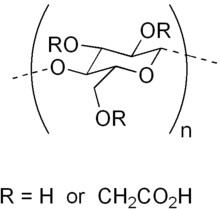Carboxymethyl Cellulose

Product Description
Carboxymethyl cellulose (CMC), a versatile water-soluble polymer, finds various industrial applications owing to its unique properties.
Product:
Carboxymethyl Cellulose
CAS:
2593534
Synonym:
Carmellose; Cellulose, carboxymethyl ether
Structure:

Typical Characteristics
Appearance
White or light yellow powder
Density
1.050 g/cm3
Melting point
300 °C (decomposes)
Molecular Weight
50000-800000
Odor
Odorless
Purity
99%
Refractive index
1.51
Uses, Applications & Markets
Key applications
get a quote
We Offer Carboxymethyl Cellulose
in various grades
A few of the grades available are listed below:



Carboxymethyl Cellulose used in many
industry applications
Carboxymethyl cellulose (CMC), a cellulose derivative with carboxymethyl groups bound to some of the hydroxyl groups of the glucopyranose monomers, finds various industrial applications owing to its unique properties. Here's a list of some of its industrial uses:
- Food Industry: CMC is widely used as a thickener, stabilizer, and emulsifier in various food products, including ice cream, bakery items, dairy products, and sauces. It helps improve texture, consistency, and shelf life.
- Pharmaceutical Industry: In pharmaceuticals, CMC serves as a binder in tablet formulations, a suspending agent in liquid medications, and a lubricant in ophthalmic solutions. It enhances the stability and delivery of active ingredients.
- Cosmetics and Personal Care: CMC is used in lotions, creams, shampoos, and toothpaste as a thickening agent, stabilizer, and film-forming agent. It improves the viscosity and texture of these products.
- Textile Industry: CMC is employed as a sizing agent in textile manufacturing to provide strength and reduce fraying of fabrics during weaving. It also acts as a thickener in textile printing pastes.
- Paper Industry: In papermaking, CMC is used as a binder and coating agent to enhance the strength and surface properties of paper. It improves printability and reduces ink bleed-through.
- Oil Drilling: CMC is utilized in oil and gas drilling fluids as a viscosity modifier and water retention agent. It helps stabilize the drilling mud and prevent fluid loss in porous formations.
- Construction Industry: CMC is added to cement and plaster formulations as a water-retaining agent and workability enhancer. It improves the application properties and durability of these materials.
- Adhesives: CMC is used in the production of water-based adhesives for applications in packaging, labeling, and woodworking. It provides good adhesion properties and easy application.
- Detergents: In detergents, CMC acts as a soil suspending agent, preventing redeposition of dirt on fabrics during washing. It enhances the cleaning performance of laundry detergents.
- Ceramics: CMC is used in ceramic processing as a binder and plasticizer to improve the workability of ceramic bodies and glazes. It aids in the shaping and drying of ceramic products.